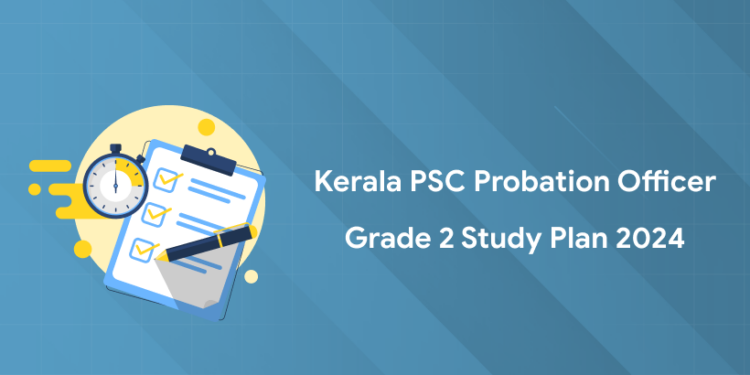Table of Contents
Preparing for the Kerala PSC Probation Officer Grade 2 exam in 2024? A structured study plan can make all the difference in your preparation. In this blog, we’ve created a simple 3-month study schedule to help you cover the entire syllabus effectively. With the right focus on key topics, practical tips, and regular practice, you’ll be well-equipped to tackle the exam. So, it’s time to start!
Kerala PSC Probation Officer Grade II Exam 2024: Highlights
| Event | Details |
| Name of Exam | Social Justice Department |
| Category Number | 577/2023 |
| Conduct By | Kerala PSC |
| Exam Organizing Body | Kerala Public Service Commission (KPSC) |
| Level of Exam | State Level |
| Qualification Required | Graduation Degree in any Discipline |
| Age Limit | 18-36 Years |
| Notification Release Date | December 29, 2023 |
| Admit Card Release Date | 05/11/2024 (Tuesday) |
| Exam Date | 19/11/2024 (Tuesday) |
| Mode of Exam | Online |
| Language | English |
| Exam Duration | 1 Hours 30 Minutes |
| Official Website | keralapsc.gov.in |
PROBATION OFFICER ONLINE COACHING – FREE DEMO
Kerala PSC Probation Officer Grade 2 Question Papers: Download PDF
1: Who was the first woman President of India?
You can download the Kerala PSC Probation Officer Grade 2 question paper PDF from the link below. Use it for practice and better understanding of the exam pattern.
| Question Paper Category | |
| 221/2017 |
Free UPSKILLING Courses!
Take your first step toward mastering in-demand skills, acing interviews, and securing top-tier jobs with Entri's free upskilling courses.
Start Learning!Kerala PSC Probation Officer Grade 2 Study Plan 2024
Here is the 3 month study plan that structured to help you cover the entire syllabus systematically and allow for revision and practice tests. The plan is divided by subjects: General Knowledge & Current Affairs, Sociology, and Social Work.
| Week | Subjects | Topics | Study Tips |
| Month 1 | General Knowledge & Current Affairs | Indian Constitution: Preamble, Fundamental Rights, Directive Principles, Structure of Government, Emergency & Amendment Provisions, Centre-State Relations, Social Welfare Legislation (RTI, Atrocities Act, Food Security Act) | Read articles & case studies. Focus on important amendments and landmark rulings. Keep up with current affairs daily. |
| Week 1-2 | Renaissance in Kerala | Introduction to Education & Missionary Role, Educational Institutions, Factories, Printing Presses. Socio-Religious Reform Movements: SNDP, Nair Service Society, Yogakshema Sabha, etc. | Focus on key movements, social revolts, and contributions of leaders like Sree Narayana Guru. |
| Women and Social Change | Key reformers: Parvathi Nenmenimangalam, A.V. Kuttimalu Amma. Literary Figures: Kumaran Asan, Vaikom Basheer, Vallathol Narayana Menon. | Study key reform movements and leaders. Take notes on their contributions. | |
| Week 3-4 | Sociology – Nature, Scope, and Social Structure | Basic Concepts: Society, Community, Social Structure, Status & Role. Social Groups: Primary, Secondary, Reference Groups, Cooperation, Conflict. Social Institutions: Marriage, Family, Kinship, Religion. | Focus on understanding key sociological terms and concepts. Draw diagrams for social groups and institutions. |
| Social Stratification | Caste, Class, Power, Gender, Social Stratification concepts. | Use real-life examples to understand stratification and its impact on society. | |
| Month 2 | Sociology – Culture, Social Change, and Stratification | Culture & Socialisation: Definitions, Types (Material & Non-material), Process. Social Control & Change: Industrialisation, Modernisation, Globalization, Secularisation. | Compare different societies (rural, urban, industrial) for better understanding of social change. |
| Week 5-6 | Social Problems in India | Key Issues: Poverty, Inequality, Religious and Ethnic Disharmony, Domestic Violence, Environmental Degradation, Crime, Corruption. | Read case studies and focus on social issues related to gender, caste, and poverty. |
| Social Research Methods | Nature & Purpose of Social Research, Research Designs, Sampling, Data Collection (Observation, Interview, Questionnaire), Statistical Analysis. | Practice research methods and basic statistics. Analyze recent surveys/reports. | |
| Week 7-8 | Social Work – Introduction and Case Work | Introduction to Social Work: Definition, Objectives, and Principles. Case Work: Phases (Engagement, Assessment, Planning, Implementation, Evaluation). Ethical Issues in Social Work. | Focus on understanding the principles and phases of casework. Review ethics and best practices in social work. |
| Developmental Psychology | Major Theories, Developmental Tasks in Early & Late Childhood. | Review child development theories and key developmental milestones. | |
| Week 9-10 | Social Work – Working with Groups and Community | Group Work: Objectives, Principles, Process (Intake, Study, Goal-setting, Evaluation). Community Organization: Models of Community Organization, Applications. | Practice with case studies on group dynamics and community-based interventions. |
| Social Work Administration | Social Work Administration: Tasks and Concepts. Relevant Legislation: Probation of Offenders Act, Juvenile Justice Act, Child Labour Act, Domestic Violence Act, POCSO Act. | Focus on key social welfare legislation and how they relate to social work practice. | |
| Month 3 | Revision and Mock Tests | General Knowledge & Current Affairs: Constitution, Welfare Legislation, Renaissance Movements, Key Leaders. Sociology: Social Stratification, Social Institutions, Social Change, and Research Methods. Social Work: Case Work, Group Work, Social Work Legislation. | Start practicing full-length mock tests covering all subjects. Review weak areas from previous tests. |
| Week 11 | Full Revision of General Knowledge & Sociology | Revise key points in Indian Constitution, Social Welfare Laws, Social Reform Movements, Sociology Concepts, Key Social Problems. | Focus on consolidating knowledge. Revise key topics like social stratification, social institutions, and key social problems. |
| Week 12 | Full Revision and Mock Tests | Final Revision: General Knowledge, Sociology, Social Work. Focus on important legislations, welfare schemes, and social reformers. Take full-length mock tests for all subjects. | Take multiple mock tests and focus on time management and accuracy. Analyze performance to identify and improve weak areas. |
Kerala PSC Probation Officer Grade 2 Study Plan 2024: Daily Routine to Follow
Update your daily routine by dedicating the morning to revising key General Knowledge and Current Affairs topics, while using the afternoon to focus on Sociology or Social Work concepts. In the evening, practice mock tests and revise weak areas to track your progress.
| Time of Day | Study Focus | Activities |
| Morning (1-2 hrs) | General Knowledge & Current Affairs |
Read newspapers, revise key concepts from the Constitution, welfare laws, and Renaissance in Kerala.
|
| Afternoon (1-2 hrs) | Sociology or Social Work (alternate weeks) |
Study theories, research methods, or case work principles.
|
| Evening (1 hr) | Mock Tests or Revision |
Take mock tests, revise previous day’s topics, focus on weak areas.
|
| Night (30 mins) | Quick Revision |
Review important topics studied during the day and note down key points.
|
Kerala PSC Probation Officer Grade 2 Study Plan 2024: Weekly Routine
| Day | Activity |
| 1-2 Days/Week |
Full-Length Mock Tests (General Knowledge, Sociology, Social Work)
|
| Rest of the Week |
Focus on revising weak areas identified during mock tests
|
| Weekend |
Review current affairs, focus on important social issues and laws.
|
Free UPSKILLING Courses!
Take your first step toward mastering in-demand skills, acing interviews, and securing top-tier jobs with Entri's free upskilling courses.
Start Learning!Preparation Tips & Tricks for Kerala PSC Probation Officer Grade 2 Exam 2024
Here are some effective tips and tricks to help you remember key concepts while preparing for the Kerala PSC Probation Officer Grade 2 exam:
1. Use Mind Maps
Draw simple mind maps to connect ideas. This makes complex topics easier to remember.
2. Create Mnemonics
Make up short phrases or acronyms to remember lists.
3. Link New Information
Connect new topics with something you already know. This helps make new information stick.
4. Active Recall
Test yourself by recalling information without looking at your notes. It improves memory.
5. Teach Someone Else
Explain topics out loud to yourself or a friend. Teaching helps you remember better.
6. Use the Pomodoro Technique
Study for 25 minutes, then take a 5-minute break. This keeps you focused.
7. Make Flashcards
Write down key points on flashcards and review them daily to keep information fresh.
8. Focus on Understanding
Understand the concepts instead of just memorizing. It’s easier to remember when you know how things work.
9. Revise Often
Review what you’ve learned regularly to keep it in your memory.
10. Practice with Previous Papers
Solve previous exam papers to get used to the questions and test your memory.











